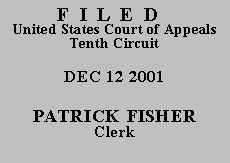

| JAMES ERNEST LANE,
v.
KEN KLINGLER; LARRY FIELDS;
MAJOR WHITEHEAD; KULCARNI;
DOYLE |
No. 01-6144
(D.C. No. CIV-98-1788-C) |
The incident from which Mr. Lane's claims stem occurred in the gymnasium of the Oklahoma State Reformatory ("OSR"). Mr. Lane claims he was attacked by a fellow inmate, Stephen Prohl, resulting in a broken ankle and facial lacerations. Mr. Lane claims that he had not known his assailant prior to the assault and that he had not provoked him. Although Mr. Lane acknowledges that Defendant Blevins, a "recreational supervisor," was present in the gym when he was attacked, he claims that the defendants provided inadequate security, and that the OSR's design is defective because it does not allow officers to monitor the gym effectively.
To establish an Eighth Amendment violation for failure to protect, a prisoner must show (1) that he was incarcerated under conditions posing a substantial risk of serious harm and (2) that the official acted with deliberate indifference to his health or safety. See Grimsley v. MacKay, 93 F.3d 676, 680-81 (10th Cir. 1996). As explained in the magistrate's extensive report, the facts alleged by Mr. Lane do not demonstrate a substantial risk of serious harm, nor deliberate indifference by the defendants. As conceded by his statement of facts, Mr. Lane did not know his assailant before the attack, nor did he allege that he had previously been threatened by him. There is no allegation that the defendants knew there was a substantial risk of serious harm to him. Further, because the defendants were not on notice that Mr. Lane was in danger, they cannot have been deliberately indifferent to his safety.
Mr. Lane's allegations about the design flaws of the OSR are conclusory and insufficient to support liability under § 1983. Mr. Lane's argument that he was in danger because of his status as a sex offender also cannot support his § 1983 claim, as he cannot establish that he was attacked because he was a sex offender. This circuit has rejected similar general claims by inmates. See, e.g., Riddle v. Mondragon, 83 F.3d 1197, 1205 (10th Cir. 1996). Accordingly, his claim for failure to protect must fail.
Mr. Lane's second claim concerns the treatment of his injuries. He was transported from the OSR to a hospital in Oklahoma City in a prison van, handcuffed to the gurney en route, and was denied pain medication during the trip. He claims that the failure to transport him in an ambulance and the deprivation of pain medication for three hours constituted cruel and unusual punishment in violation of the Eighth Amendment. For such a claim to be actionable under § 1983, Mr. Lane must demonstrate that the defendants were deliberately indifferent to a serious illness or injury. See Estelle v. Gamble, 429 U.S. 97, 104-105 (1976).
As discussed at length in the magistrate's report, neither Mr. Lane's complaints about the method in which he was transported, nor the denial of pain medication rise to this level. Mr. Lane states that Defendant Bernard did not administer pain medication immediately because he believed that surgery on plaintiff's ankle was imminent. A delay in providing medical treatment is not actionable unless it is occasioned by "deliberate indifference which results in substantial harm," which has not been demonstrated here. Olson v. Stotts, 9 F.3d 1475, 1477 (10th Cir. 1993). Therefore, Mr. Lane's claim for deliberate indifference to his serious medical needs must fail.
For the reasons stated in the magistrate's report and recommendation, we AFFIRM the district court's dismissal of this case. We grant Mr. Lane's motion to proceed in forma pauperis.
ENTERED FOR THE COURT
David M. Ebel
Circuit Judge
*.After examining appellant's brief and the appellate record, this panel has determined unanimously that oral argument would not materially assist the determination of this appeal. See Fed. R. App. P. 34(a)(2) and 10th Cir. R. 34.1(G). The case is therefore ordered submitted without oral argument. This Order and Judgment is not binding precedent, except under the doctrines of law of the case, res judicata, and collateral estoppel. The court generally disfavors the citation of orders and judgments; nevertheless, an order and judgment may be cited under the terms and conditions of 10th Cir. R. 36.3.
1. Mr. Lane has also filed a separate appeal of the district court's denial of his Rule 59 Motion to Amend/Alter and its denial of his Rule 60 Motion to Reconsider. These claims are addressed in the Order and Judgment filed in his companion case, Lane v. Fields, et al., No. 01-6248.